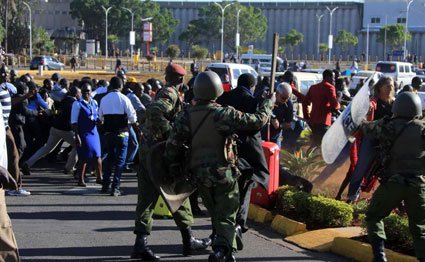The strike action by aviation sector employees on March 6 at the Jomo Kenyatta International Airport (JKIA) in the Kenya’s capital city of Nairobi was met with repression by riot police. The police charged at the picket with batons, and chased the striking workers out of the airport. Six union leaders and four members are reported to have been arrested. At least four flights were canceled, and 26 more delayed or diverted as a result of the strike.
The strike was called by the Kenya Aviation Workers Union (KAWU) against the government’s decision to hand over the airport to private interests. The airport, built with taxpayers’ money, is presently owned by the government, and run by the Kenya Airports Authority (KAA).
The JKIA – the busiest airport in East Africa catering to more than 40 passenger and 25 cargo airlines – is the single biggest source of revenue for KAA. However, the airport is being handed over to Kenya Airways for a period of 30 years. The government claims that this is to bail out the loss-making and indebted Kenya Airways. But the handover of this profitably run airport to Kenya Airways has provoked staunch opposition because the majority of the shares of the airline are owned by private entities. While 13% of Kenya Airways is owned by KLM Royal Dutch Airlines, another 35.69% is owned by a conglomeration of 11 banks that decided last year to convert the company’s debt into equity, which opens the stocks of the company for further sale in the market where it can be bought by private entities. Only 46.53% of the stakes are held by the Kenyan government.
Responding to KAWU’s call for industrial action against this decision, employees of KAA as well as those working for Kenya Airways, including cabin crew members, airport security staff, air traffic controllers and engineers servicing the airplanes, participated in the strike.
Opposition has also come from other sections. The parliamentary Public Investment Committee (PIC) warned on March 2 that handing over this crucial airport to Kenya Airways will deprive the latter of the funds required to run the other airports under its control.
The amount which will be paid by Kenya Airways will still leave the KAA with a shortfall of USD 37 million, out of the USD 66 million required by it this year to operate the rest of the airports. The resulting more than 50% shortage of funds will inevitably cause their deterioration, following which, privatization of the remaining airports may again be prescribed as a solution.
Such suspicion is well founded, given that the policy paper – in which the controversial plan was first mooted – approved by the government mid-last year, had argued that the merger of major airports with Kenya Airways was necessary in order to address the financial woes of the latter. According to the paper, the merger is sought to make the airline capable of competing with rivals such as Ethiopian Airlines, Emirates and RwandAir, which operate in a relatively high degree of synergy with their home airports.
However, it should be noted that all of the more efficient rivals that Kenya Airways seeks to compete with are 100% owned by their respective governments, which, by virtue of also controlling the airports, have been able to achieve this synergy in operation.
President’s conflict of interest
Critics of the deal have also pointed out that the president, Uhuru Kenyatta, himself has a financial stake in it.
Kenya Airways is in no position to repay the loan of USD 40 million which it had borrowed from the Commercial Bank of Africa, in which the president’s family is the biggest stakeholder. The decision to allow Kenya Airways to expropriate the revenue from an airport currently run by a public enterprise has been perceived as a “a grand debt recovery plan”.
“[I]t is totally wrong, and even criminal, to imagine [Kenya Airways] taking over JKIA,” KAWU said in a statement on March 4 while announcing the strike. “Kenya will lose billions of shillings in revenue, not to mention massive job losses that will ruin livelihoods,” warned the union’s secretary-general, Moses Ndiema, who was arrested after the police crackdown on the strike.
Transport cabinet secretary James Macharia responded to the strike notice by calling the unionized workers a “bunch of criminals”, and warning that the strike will not be tolerated because airports are national security installations.
James Macharia’s assertions that the Airport is a national security installation does not make it illegal for workers to exercise their constitutional right, but it actually takes us back to the question of the attempted backdoor privatization of the Airports,” the secretary general of the Communist Party of Kenya (CPK), Benedict Wachira, responded, in a statement.
“Why,” he asked, “is this government planning to privatize a national security installation? Why is a Kenyan security installation being run and managed by a Norwegian foreigner by the name Jonny Andersen? Since Kenya Airways is a significant player at this national security installation, why is it being run and managed by a Polish foreigner, by the name Sebastian Mikosz?”
Declaring CPK’s solidarity with strike action, he pointed out that, “The workers [of Kenya Airways] have also.. asked why the top management have paid themselves over sh1.3 billion [over USD 13 million] within a period of 18 months, at a time when the airline is still struggling with losses,” adding, “It is absurd that what Sebastian Mikosz earns in two months is what the President of Kenya earns in a whole year!”





